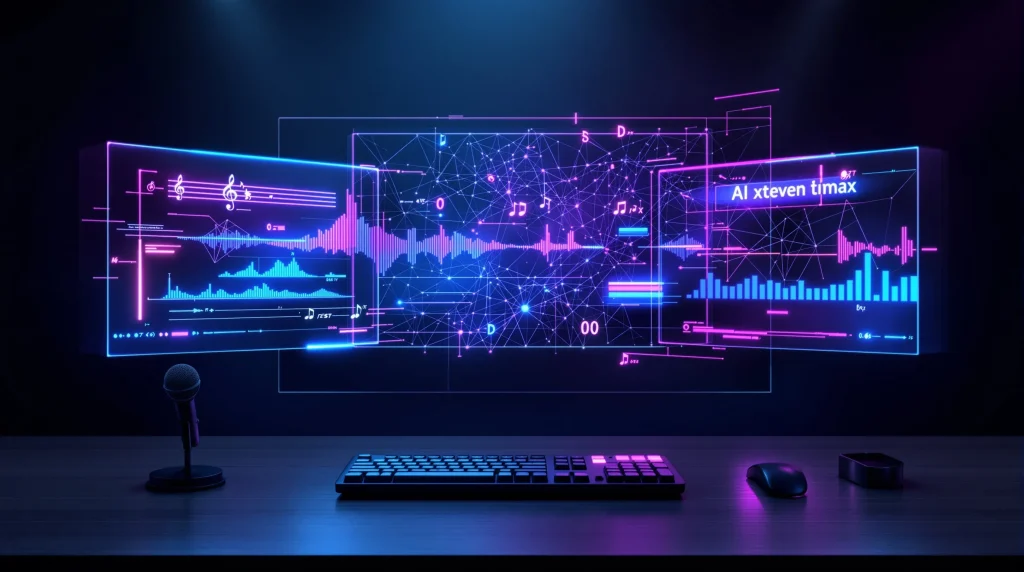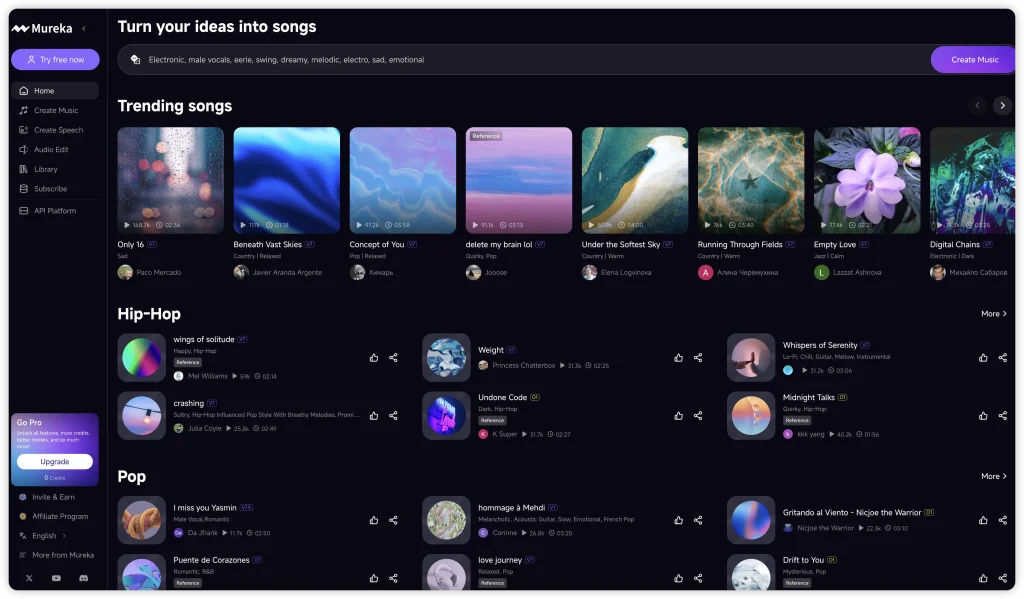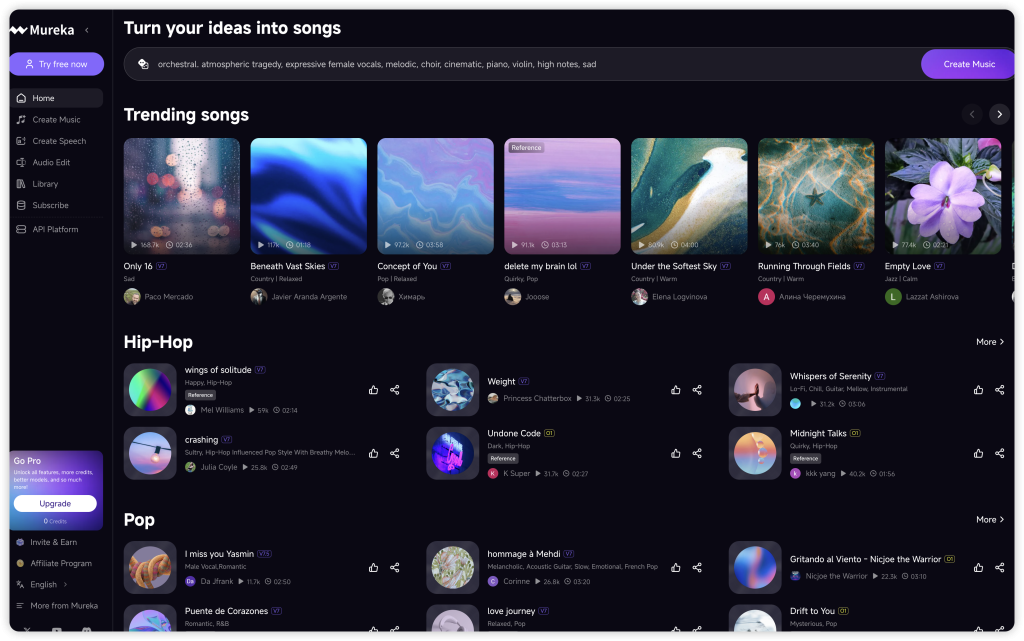
Stiamo vivendo una rivoluzione creativa. La produzione musicale, un tempo confinata a studi di registrazione con attrezzature costose e anni di formazione, sta diventando accessibile a chiunque abbia un'idea e una connessione a Internet. In prima linea in questo cambiamento c'è Mureka AI, una piattaforma che trasforma il testo in brani musicali originali e raffinati in pochi minuti. Che siate creatori di contenuti alla ricerca della colonna sonora perfetta, musicisti che esplorano nuovi territori sonori o semplicemente curiosi di sapere cosa può fare l'intelligenza artificiale con alcune parole digitate, Mureka AI offre una risposta interessante. In questa guida vi spiegheremo tutto quello che c'è da sapere: cos'è, come funziona, cosa lo distingue e se è lo strumento giusto per il vostro flusso di lavoro creativo.
Che cos'è Mureka AI?
Mureka AI è una piattaforma di generazione musicale alimentata dall'intelligenza artificiale, progettata per trasformare suggerimenti testuali, testi e riferimenti stilistici in brani musicali completi e pronti per la produzione. Sviluppata con modelli di deep learning addestrati su vasti set di dati musicali, consente agli utenti di creare brani originali senza bisogno di competenze tradizionali di composizione o di software costosi.
A differenza dei generatori MIDI di base o delle librerie di loop preimpostati, Mureka AI genera composizioni completamente realizzate, melodie, armonie, arrangiamenti e persino voci. Si inserisce ciò che si desidera (uno stato d'animo, un genere, un testo) e la piattaforma produce un brano che suona come se fosse stato realizzato da un produttore umano. Non è solo un giocattolo per hobbisti. La qualità e la flessibilità lo rendono utile per i creatori di contenuti professionali, i musicisti indie, i registi e gli operatori di marketing che hanno bisogno di musica personalizzata in tempi rapidi.
Ciò che distingue Mureka è l'attenzione al controllo e alla personalizzazione. Non si tratta solo di premere un pulsante e sperare nel meglio. La piattaforma offre strumenti per mettere a punto gli stili vocali, fare riferimento a canzoni esistenti per individuare la direzione stilistica, separare le tracce dei singoli strumenti e modificare l'output finale. È in parte un partner creativo, in parte un assistente di produzione, ed è progettata per adattarsi ai flussi di lavoro del mondo reale, dove i vincoli di tempo e di budget sono importanti.
Come funziona Mureka AI
Mureka AI utilizza modelli generativi avanzati, come reti neurali addestrate su milioni di campioni musicali, modelli audio e performance vocali. Questi modelli imparano la struttura, il ritmo, l'armonia e le sfumature stilistiche di diversi generi, quindi applicano queste conoscenze per generare nuove composizioni sulla base dei vostri input.
Ecco il procedimento semplificato:
Si inizia fornendo una richiesta di testo o un testo. Il testo può essere semplice, come “canzone indie pop in levare sull'estate” o dettagliato, come una serie completa di strofe e ritornelli. L'intelligenza artificiale interpreta il vostro input, analizzando l'umore, il tempo e la direzione tematica.
Successivamente, il modello genera un brano musicale arrangiamento. Compone melodie, seleziona la strumentazione, costruisce progressioni di accordi e struttura la canzone (introduzione, strofa, ritornello, bridge, outro). Se avete fornito il testo, lo mappa alla melodia e al ritmo, assicurandosi che le sillabe si allineino naturalmente al ritmo.
Se si desidera una voce, Mureka può sintetizzarla utilizzando modelli vocali AI. È possibile scegliere tra stili vocali preimpostati o addirittura clonare una voce (per saperne di più). L'intelligenza artificiale gestisce l'intonazione, il tono, il vibrato e il fraseggio per rendere la voce espressiva e simile a quella umana.
Infine, è possibile perfezionare l'output. Regolate le sezioni, rigenerate le parti che non vi soddisfano o usate i riferimenti di stile per guidare l'AI verso un suono specifico. Una volta soddisfatti, si può esportare la traccia, come mix completo o come file separati per un ulteriore editing in una DAW.
La magia sta nel modo in cui questi passaggi si collegano senza soluzione di continuità. Non è necessario conoscere la teoria musicale o l'ingegneria audio. L'intelligenza artificiale si occupa del lavoro tecnico pesante, mentre voi vi concentrate sulla visione creativa.
Caratteristiche principali di Mureka AI Music Generator
Creazione di testi e canzoni
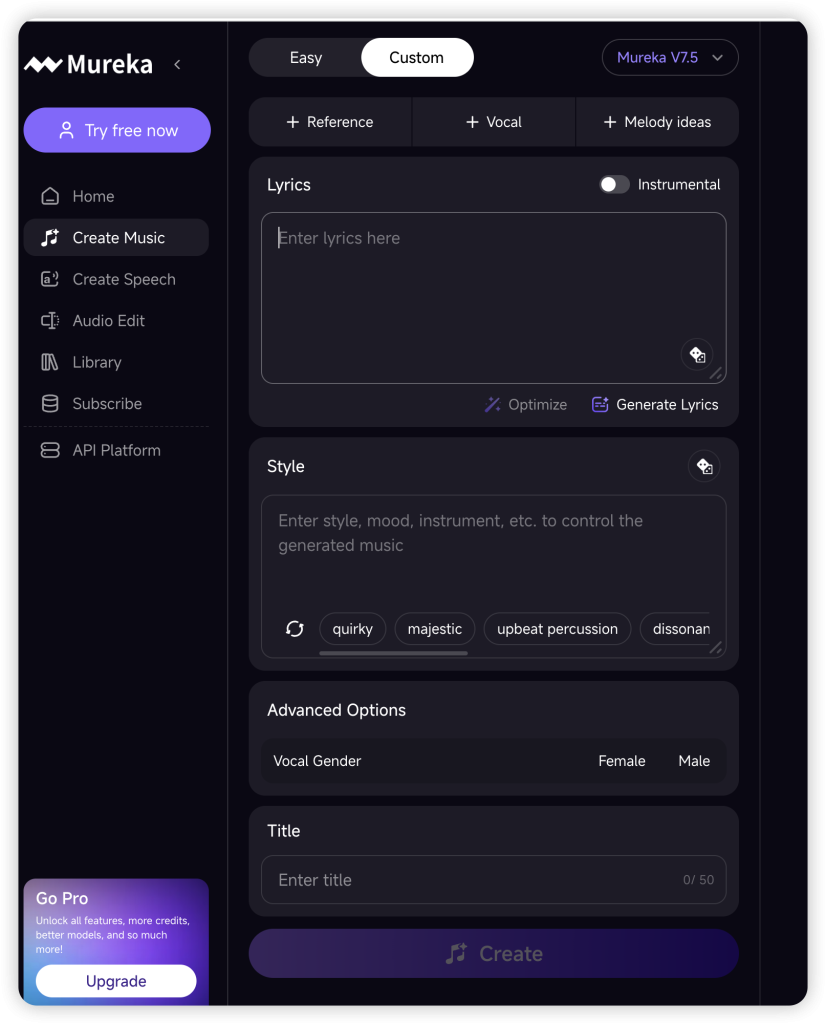
Una delle caratteristiche principali di Mureka è la capacità di prendere un testo scritto e trasformarlo in una canzone completa di melodia, armonia e arrangiamento. Non si tratta solo di strumentali con parole maldestramente incollate sopra, ma l'intelligenza artificiale comprende il fraseggio, il ritmo e il modo in cui il testo dovrebbe fluire con la musica.
Questo è incredibilmente utile per gli autori di canzoni che hanno le parole ma faticano a comporle, o per i creatori di contenuti che hanno bisogno di un brano personalizzato con un messaggio specifico. È possibile inserire qualsiasi cosa, da un paio di righe a un'intera struttura di canzone, e Mureka farà il resto. Se il primo risultato non è del tutto soddisfacente, è possibile modificare il suggerimento o rigenerare le sezioni fino a quando non si sentono bene.
Personalizzazione e clonazione vocale AI
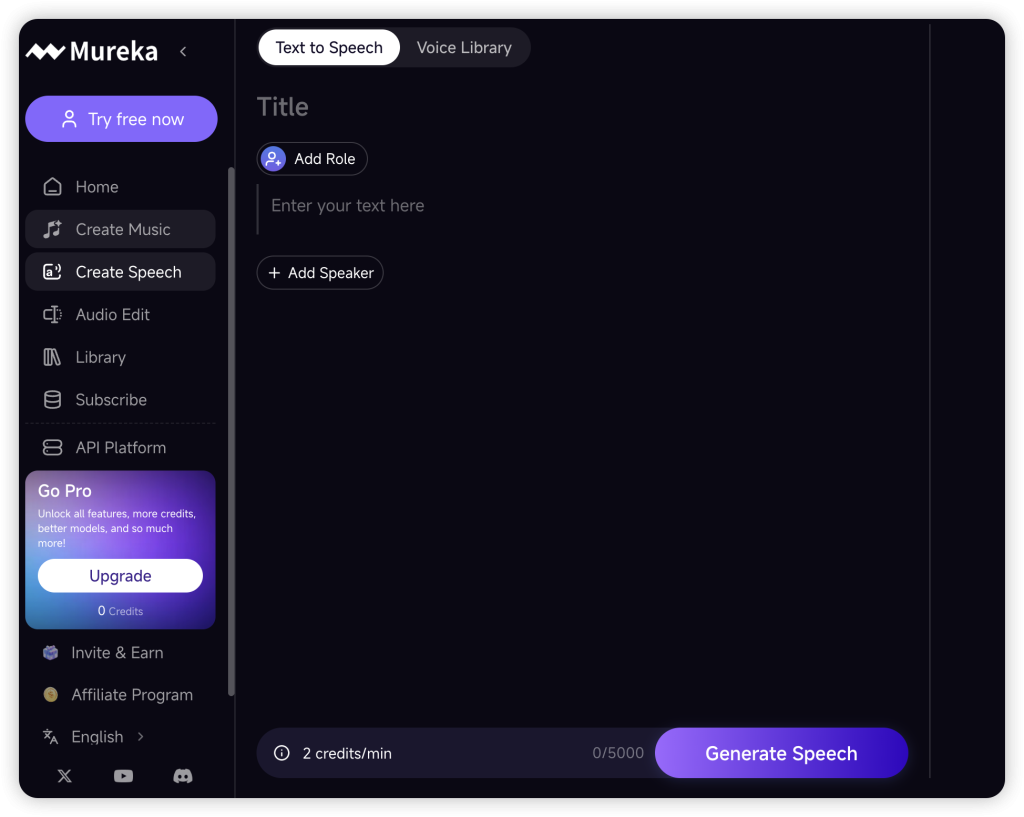
Mureka permette di controllare la performance vocale in modi che prima richiedevano uno studio di registrazione e un cantante di talento. È possibile scegliere tra una serie di stili vocali generati dall'intelligenza artificiale, maschili, femminili, timbri diversi, toni emotivi, e la piattaforma sintetizzerà le voci che si adattano al brano.
Ancora più impressionante è la funzione di clonazione della voce. Caricate un campione di voce (la vostra, quella di un collaboratore o una registrazione royalty-free) e Mureka può addestrare un modello per replicare quello stile vocale. In questo modo è possibile creare un marchio vocale coerente in tutti i progetti, o per gli artisti che vogliono sperimentare diversi personaggi vocali senza dover assumere cantanti di sessione.
Naturalmente, questo potere comporta considerazioni etiche. Mureka prevede delle salvaguardie per evitare un uso improprio, richiedendo il consenso e la verifica per la clonazione vocale. Ma se usato in modo responsabile, è una svolta per i musicisti e i creatori indipendenti.
Riferimento stilistico e controllo musicale
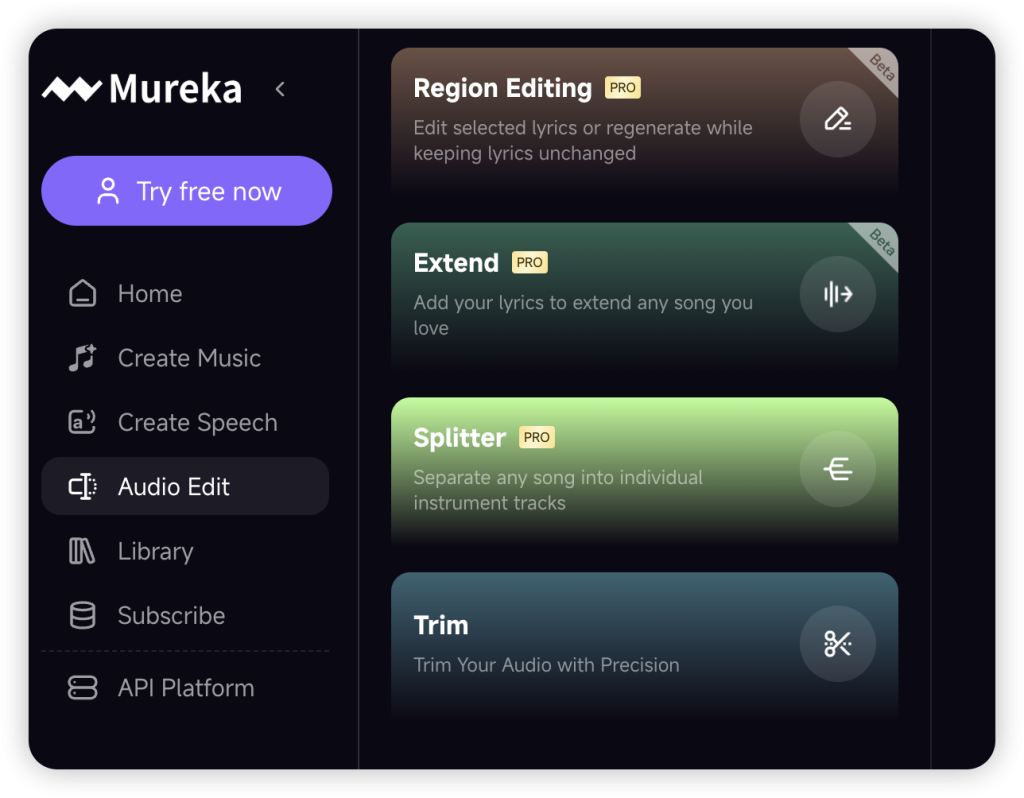
Volete che il vostro brano suoni come un genere, un artista o una canzone specifica? La funzione di riferimento stilistico di Mureka consente di caricare o collegare un brano di esempio e l'intelligenza artificiale ne analizzerà le caratteristiche, il tempo, la strumentazione, l'atmosfera, lo stile di produzione e applicherà questi elementi alla vostra nuova composizione.
Questo non significa copiare il lavoro di qualcun altro. Si tratta di dare all'IA una direzione creativa, come dire a un produttore: “Voglio qualcosa che abbia l'atmosfera dell'indie rock dei primi anni 2000” o “Fai in modo che suoni come un beat hip-hop lo-fi”. Il risultato sarà originale, ma influenzato dal riferimento fornito dall'utente.
È inoltre possibile ottenere un controllo granulare sui parametri musicali: regolare il tempo, la tonalità, il livello di energia e la strumentazione. Questo livello di flessibilità consente di non rimanere bloccati su un unico risultato, ma di iterare e perfezionare il brano finché non corrisponde alla vostra visione.
Separazione ed esportazione multitraccia
Per i creatori che vogliono scavare più a fondo, Mureka offre la separazione multitraccia (stem). Dopo aver generato una canzone, è possibile esportare i singoli elementi, voce, batteria, basso, melodia, sintetizzatori, come file audio separati.
Questo è un vantaggio enorme per chi vuole usare la musica generata dall'IA come punto di partenza per un'ulteriore produzione. Forse vi piacciono la batteria e la linea di basso ma volete cambiare la melodia, oppure volete aggiungere la vostra chitarra dal vivo all'arrangiamento dell'IA. L'accesso alle tracce isolate rende tutto più semplice.
È utile anche per il mixaggio e il mastering. È possibile importare gli steli nella DAW preferita (Ableton, Logic, FL Studio, ecc.) e applicare effetti, bilanciare i livelli o modificare l'equalizzazione dei singoli elementi per ottenere un prodotto finale più curato.
Generazione di musica multilingue
Mureka non si limita all'inglese. La piattaforma supporta la generazione di musica in più lingue, rendendola accessibile ai creatori di tutto il mondo e consentendo la produzione di contenuti specifici per ogni regione.
Che si tratti di un inno pop spagnolo, di una ballata in mandarino o di un brano indie francese, Mureka è in grado di gestire le sfumature linguistiche e di generare voci dal suono naturale nella lingua di destinazione. Questa funzione è particolarmente preziosa per i marchi globali, i creatori di contenuti internazionali e gli artisti che desiderano raggiungere pubblici diversi.
Come utilizzare Mureka AI: guida passo dopo passo
Iniziare a lavorare con Mureka AI è semplice, anche se non si è mai toccato uno strumento di produzione musicale. Ecco come seguire il processo:
Fase 1: Registrazione e accesso alla piattaforma
clicca qui per registrarti o accedere con un account google
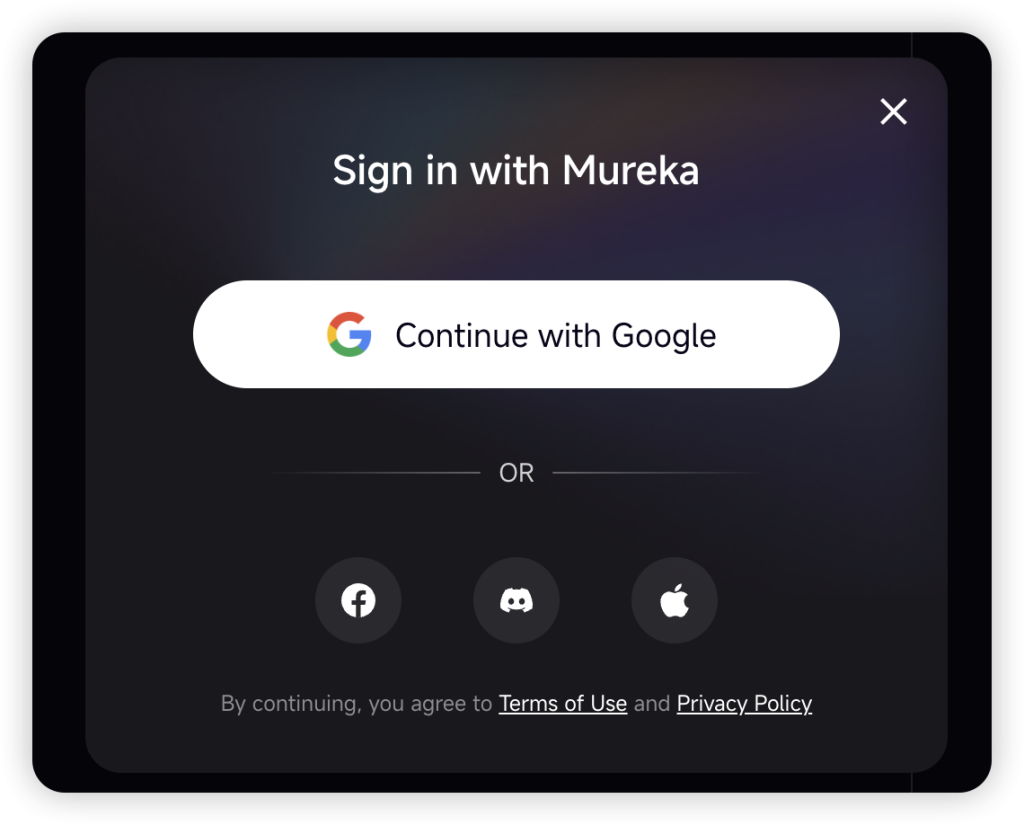
Andate sul sito web di Mureka AI e create un account. La maggior parte delle piattaforme offre un livello gratuito o di prova, in modo da poter testare le acque prima di impegnarsi in un piano a pagamento.
Fase 2: Scegliere il metodo di creazione
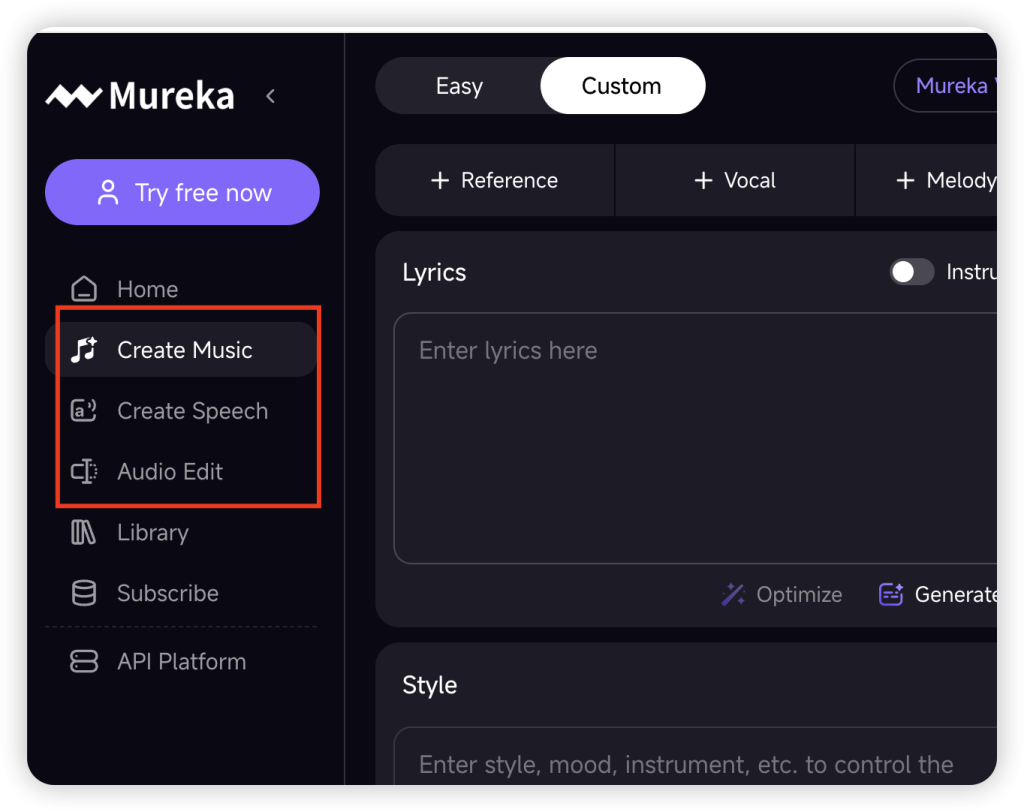
Decidete se volete generare musica da una richiesta di testo, se volete inserire un testo o se volete usare un riferimento stilistico. Se state solo esplorando, iniziate con una richiesta semplice come “brano elettronico da brivido per lo studio” per vedere cosa produce l'intelligenza artificiale.
Fase 3: inserimento del testo o del promemoria
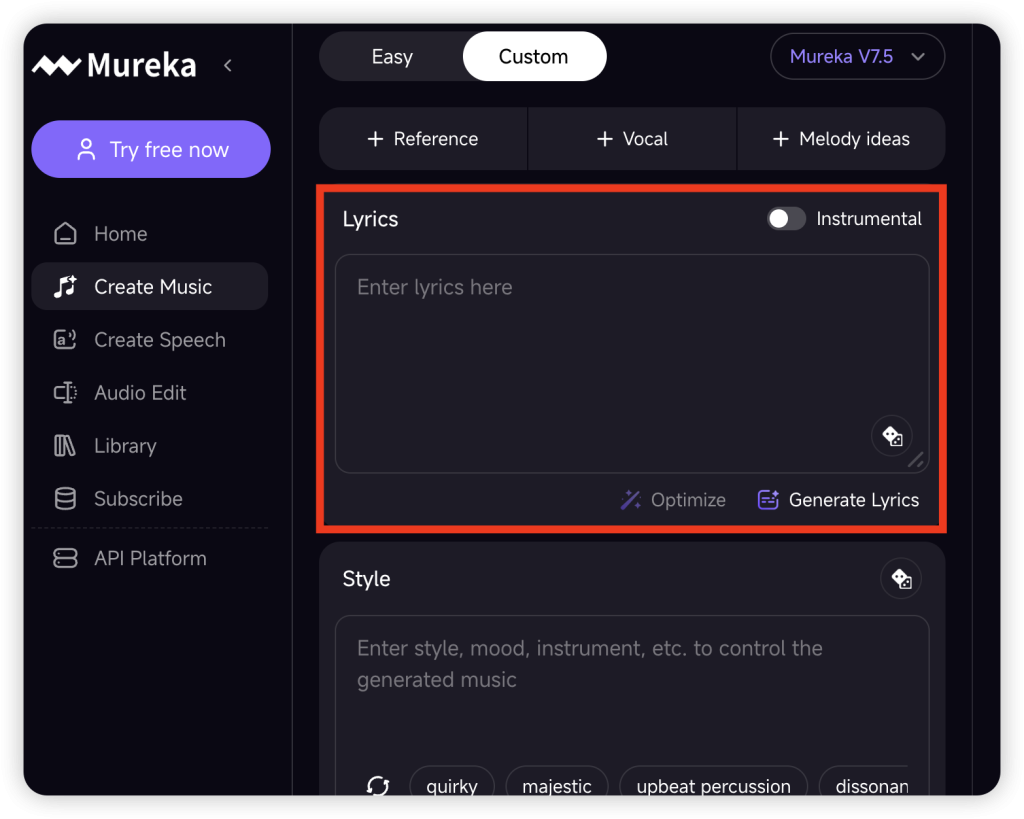
Digitate la vostra descrizione o incollate il vostro testo. Siate specifici o ampi quanto volete. L'intelligenza artificiale è abbastanza brava a interpretare le richieste vaghe, ma un maggior numero di dettagli di solito produce risultati migliori. Ad esempio, “upbeat 80s synthwave with nostalgic vibes” darà all'IA una direzione più chiara rispetto a “fun song”.”
Passo 4: Personalizzazione delle impostazioni
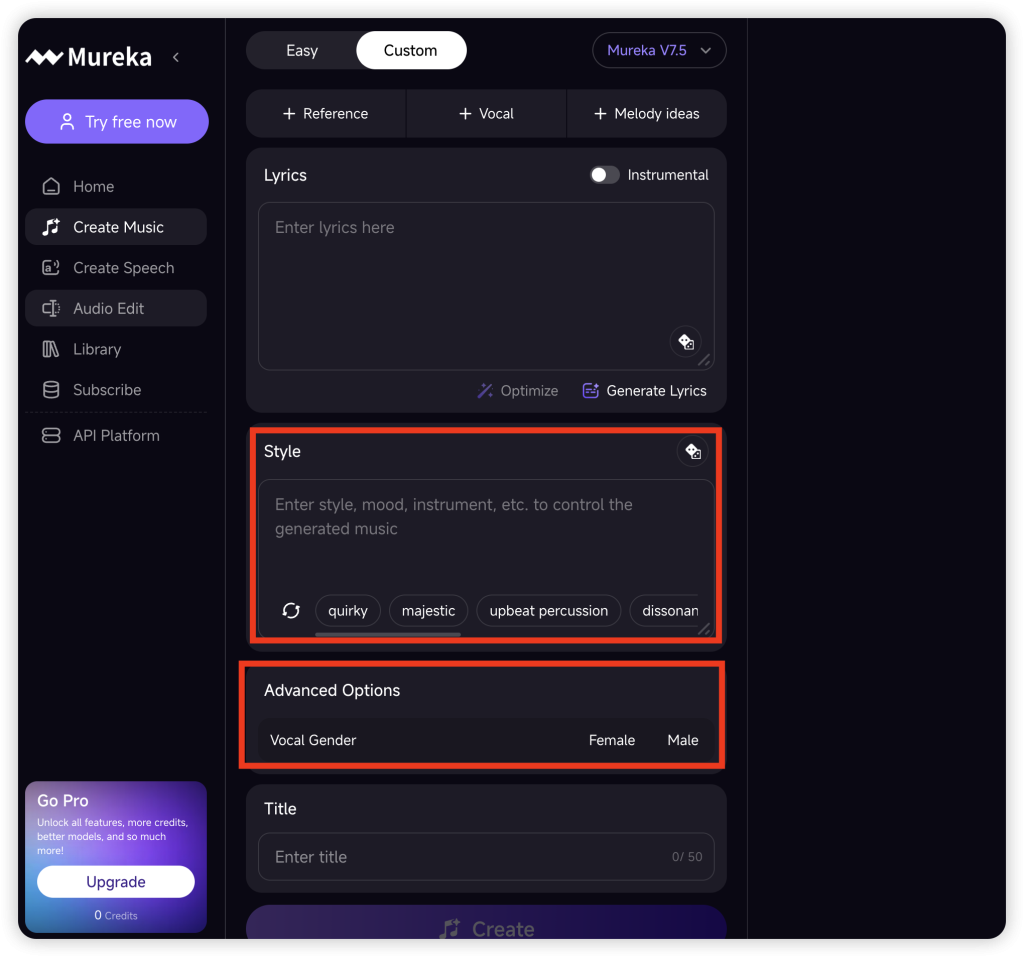
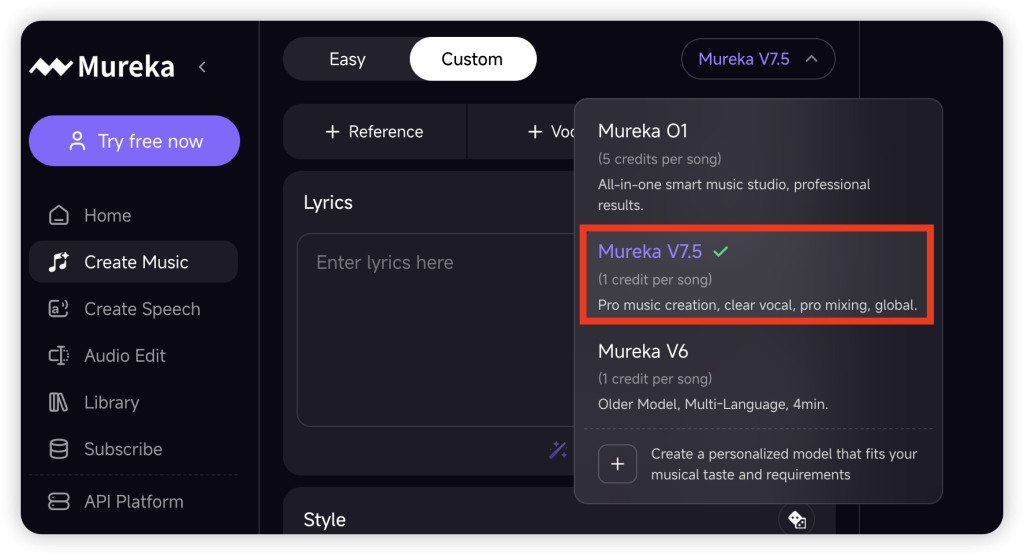
Selezionate lo stile vocale che preferite, regolate il tempo e la tonalità se avete esigenze specifiche e caricate una traccia di riferimento dello stile se volete guidare la direzione creativa dell'AI.
Fase 5: generazione della traccia
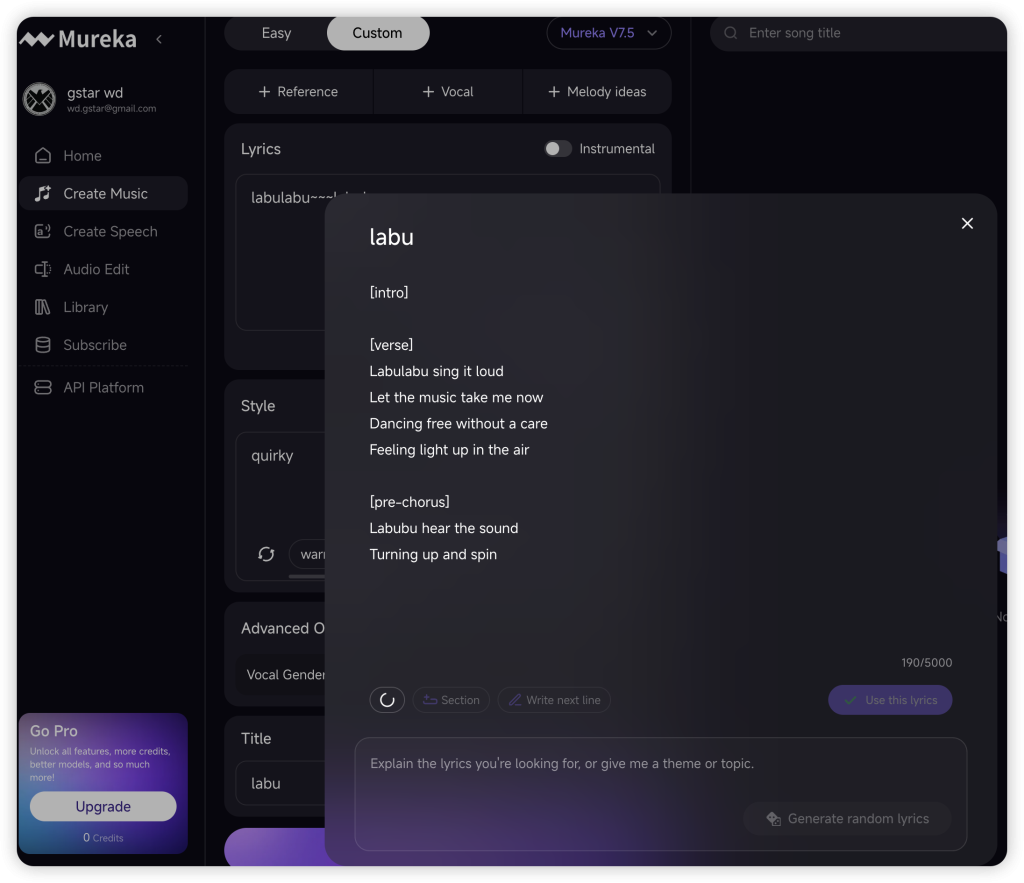
Premere genera e attendere. A seconda del carico del server e della complessità della traccia, questa operazione può richiedere da pochi secondi a un paio di minuti. L'intelligenza artificiale fa molto lavoro pesante dietro le quinte, componendo, arrangiando, sintetizzando le voci e mixando, quindi si prevede un'attesa breve.
Fase 6: revisione e perfezionamento
Ascoltate l'output. Se non è del tutto corretto, si possono rigenerare le sezioni, modificare i parametri o adattare il prompt. L'interfaccia di Mureka permette di solito di iterare rapidamente, quindi non abbiate paura di sperimentare.
Passo 7: Esportare la musica
Una volta soddisfatti del risultato, esportate la traccia. Scegliete tra un mix completo (singolo file audio) o uno stem multitraccia, se intendete effettuare ulteriori modifiche. Scaricate e il gioco è fatto.
L'intero processo può durare appena cinque minuti per un brano semplice, o più a lungo se si vuole approfondire la personalizzazione. In ogni caso, si tratta di una frazione del tempo richiesto dalla produzione musicale tradizionale.
Applicazioni pratiche di Mureka AI
Creazione di contenuti e social media
Per YouTubers, TikTokers, podcasters e creatori di Instagram, la musica è un'esigenza costante. Servono intro, outro, brani di sottofondo e colonne sonore per creare l'atmosfera, e devono essere unici, royalty-free e in linea con il marchio.
Mureka AI risolve questo problema. Invece di setacciare librerie di musica generica o di rischiare di essere colpiti dal diritto d'autore, potete generare brani personalizzati su misura per ogni contenuto. Avete bisogno di un jingle in levare per una recensione di un prodotto? Un brano ambient lunatico per un video in stile documentario? Un brano accattivante per l'introduzione di un marchio? Mureka può produrlo in pochi minuti.
Perché il la musica è generata dall'intelligenza artificiale e originale, non dovete preoccuparvi di problemi di licenza. Il risultato è di vostra proprietà (nel rispetto dei termini della piattaforma), il che significa che potete utilizzarlo a fini commerciali senza costi aggiuntivi.
Musica di sottofondo per film, giochi e video
I registi indipendenti e gli sviluppatori di videogiochi spesso operano con budget limitati e l'assunzione di un compositore o la concessione in licenza di musica professionale possono essere proibitivi. Mureka offre un'alternativa economica senza sacrificare la qualità.
È possibile generare colonne sonore di sottofondo che si adattano a scene specifiche, tese, drammatiche, edificanti, misteriose, ed esportare tracce multiple per un editing preciso. Avete bisogno di un brano che cresca d'intensità nell'arco di 90 secondi? Potete guidare l'IA a creare esattamente questo.
Per gli sviluppatori di giochi, la possibilità di produrre più variazioni di un tema (musica di battaglia, musica di esplorazione, musica di menu) in modo rapido e conveniente è un enorme vantaggio. La flessibilità e la velocità di Mureka lo rendono uno strumento pratico per progetti con tempi brevi e risorse limitate.
Progetti musicali personali e sperimentazione
Non tutti coloro che utilizzano Mureka sono creatori professionisti. Alcuni di noi vogliono solo scherzare, vedere cosa può fare l'intelligenza artificiale o dare vita a un'idea musicale personale senza anni di formazione.
Forse avete sempre voluto scrivere una canzone ma non suonate uno strumento. Forse siete degli hobbisti che amano sperimentare nuovi suoni. Forse pensate che sia fantastico poter digitare alcune frasi e ottenere un brano completamente prodotto. Mureka rende possibile tutto questo.
È anche uno strumento di apprendimento. Generando brani e analizzando ciò che l'intelligenza artificiale produce, come struttura un brano, sceglie la strumentazione e gestisce la melodia, si possono acquisire conoscenze sulla composizione e sulla produzione musicale. È un modo poco impegnativo per esplorare la creatività e sviluppare il proprio orecchio musicale.
Prezzi e accesso a Mureka AI
Le strutture dei prezzi delle piattaforme musicali di intelligenza artificiale possono variare e Mureka AI offre in genere alcuni livelli per soddisfare le diverse esigenze degli utenti.
La maggior parte delle piattaforme inizia con un livello gratuito o di prova, che vi offre crediti o generazioni limitate al mese. È l'ideale per testare la piattaforma, generare alcune tracce e decidere se è adatta al proprio flusso di lavoro. I livelli gratuiti di solito prevedono alcune restrizioni, una qualità audio più bassa, esportazioni filigranate o un accesso limitato a funzioni premium come la clonazione della voce.
Piani a pagamento sbloccare tutte le funzionalità: esportazioni di qualità superiore, crediti di generazione illimitati o notevolmente aumentati, accesso a strumenti di personalizzazione avanzati, esportazioni multitraccia e diritti di utilizzo commerciale. I prezzi sono generalmente suddivisi in modelli di abbonamento mensile o annuale, con piani annuali che offrono uno sconto.
Per i professionisti e le aziende, ci possono essere piani aziendali o di squadra con ulteriori funzioni di collaborazione, assistenza prioritaria e licenze a volume.
Prima di impegnarvi, vi consigliamo di controllare l'attuale pagina dei prezzi di Mureka (queste cose cambiano) e di approfittare di una prova gratuita per assicurarvi che la piattaforma soddisfi le vostre esigenze. Prestate attenzione ai termini di licenza, soprattutto se intendete utilizzare la musica a fini commerciali: alcuni livelli includono tutti i diritti commerciali, mentre altri possono avere delle restrizioni.
Limitazioni e considerazioni
Mureka AI è impressionante, ma non è perfetta. Come ogni strumento, ha dei limiti che vale la pena di capire prima di immergersi.
Sfumature creative e profondità emotiva: Mentre l'IA può generare musica tecnicamente valida, Ma non sempre riesce a cogliere le sottili sfumature emotive che un compositore umano potrebbe apportare. Se il vostro progetto richiede una partitura profondamente personale o altamente espressiva, potreste comunque aver bisogno di un tocco umano.
Imprevedibilità: L'intelligenza artificiale generativa può essere un po' un jolly. A volte si ottiene esattamente ciò che si è immaginato al primo tentativo, altre volte sono necessarie diverse iterazioni. La qualità e la pertinenza dei risultati possono variare, soprattutto con richieste vaghe o complesse.
Questioni etiche e legali: La musica generata dall'intelligenza artificiale solleva questioni relative all'originalità, al copyright e al ruolo della creatività umana. Se si utilizza la clonazione vocale, ci sono considerazioni etiche relative al consenso e al potenziale uso improprio. Assicuratevi sempre di avere il diritto di utilizzare i campioni vocali che caricate e rispettate i termini di servizio.
Limiti di genere e di stile: Pur supportando un'ampia gamma di generi, Mureka può ottenere risultati migliori in alcuni stili rispetto ad altri. I generi altamente di nicchia o sperimentali potrebbero non dare i migliori risultati, semplicemente perché i dati di addestramento potrebbero essere meno robusti in queste aree.
Qualità audio: La musica generata dall'intelligenza artificiale ha fatto molta strada, ma gli audiofili e i produttori professionisti potrebbero notare artefatti o incoerenze di missaggio, soprattutto negli arrangiamenti complessi. Per le versioni broadcast o ad alta fedeltà, potrebbe essere necessario un ulteriore lavoro di post-produzione.
Non si tratta di problemi fondamentali, ma è bene tenerli a mente. Mureka è uno strumento potente, non una bacchetta magica. Funziona meglio se abbinato a una chiara direzione creativa e ad aspettative realistiche.
Mureka AI vs. alternative: Come si confronta
Mureka AI non è l'unico attore nello spazio della generazione musicale AI. Piattaforme come Suno AI, AIVA, Soundraw, Boomy e Amper Music offrono funzionalità simili, ognuna con i propri punti di forza e compromessi.
Suno AI è noto per l'impressionante generazione vocale e la facilità d'uso, che lo rendono un forte concorrente per la creazione di canzoni basate sui testi. È popolare tra gli utenti occasionali e i creatori di contenuti che desiderano brani veloci e orecchiabili.
AIVA si concentra maggiormente sulle composizioni strumentali ed è spesso preferito da registi e sviluppatori di videogiochi che hanno bisogno di colonne sonore orchestrali o cinematografiche. Offre una profonda personalizzazione, ma ha una curva di apprendimento più ripida.
Suoni stridenti e rimbombanti I software di grafica sono caratterizzati da velocità e semplicità, con interfacce drag-and-drop e stili preimpostati. Sono ottimi per i principianti, ma potrebbero non avere il controllo preciso che gli utenti più avanzati desiderano.
Dove si colloca Mureka? Diremmo che è in equilibrio tra facilità d'uso e funzioni avanzate. È abbastanza accessibile per i principianti, ma offre le opzioni di personalizzazione e di esportazione multitraccia che i professionisti apprezzano. Le funzioni di clonazione della voce e di riferimento dello stile sono particolarmente efficaci e danno un vantaggio ai creatori che desiderano un maggiore controllo sull'output finale.
Detto questo, la piattaforma migliore dipende dalle vostre esigenze specifiche. Se si tratta principalmente di musica strumentale di sottofondo, AIVA potrebbe essere più adatta. Se volete l'interfaccia più semplice e veloce, Boomy o Soundraw potrebbero andare bene. Ma per uno strumento completo, in grado di gestire sia le voci che gli strumenti con un buon grado di controllo, Mureka è una scelta solida.
Conclusione
Mureka AI rappresenta un significativo balzo in avanti nella creazione di musica accessibile. Non sostituirà musicisti, compositori o produttori umani, ma non ne ha bisogno. Ciò che fa è democratizzare la produzione musicale, mettendo potenti strumenti creativi nelle mani di persone che altrimenti non avrebbero mai potuto accedervi.
Per i creatori di contenuti, è una soluzione pratica all'infinita necessità di musica originale. Per gli artisti indipendenti, è un collaboratore in grado di stimolare idee e accelerare i flussi di lavoro. Per gli hobbisti e gli sperimentatori, è un parco giochi in cui dare vita a idee musicali senza bisogno di anni di formazione.
Abbiamo analizzato cos'è Mureka, come funziona, quali sono le sue caratteristiche principali e come si inserisce nei flussi di lavoro creativi del mondo reale. Siamo anche stati onesti sui suoi limiti e su come si colloca rispetto alle alternative. Il risultato finale? Se avete bisogno di musica personalizzata e non avete il tempo, il budget o le competenze per una produzione tradizionale, vale la pena di esplorare Mureka AI.
La tecnologia è ancora in evoluzione e ci aspettiamo che piattaforme come Mureka diventino ancora migliori, più sfumate, più flessibili, più capaci di catturare la sottile magia che fa risuonare la musica. Per ora, è già uno strumento potente che sta cambiando il modo di pensare alla creazione musicale. E questo è un aspetto a cui vale la pena prestare attenzione.
Domande frequenti
Che cos'è Mureka AI e come funziona?
Mureka AI è una piattaforma di generazione musicale alimentata dall'intelligenza artificiale che trasforma suggerimenti testuali e testi in brani musicali completi e pronti per la produzione. Utilizza modelli generativi avanzati addestrati su milioni di campioni musicali per creare composizioni originali con melodie, armonie, arrangiamenti e voci in pochi minuti.
Mureka AI può generare canzoni con voci personalizzate?
Sì, Mureka AI offre funzioni di personalizzazione vocale e clonazione vocale. È possibile scegliere tra stili vocali preimpostati o caricare un campione vocale per addestrare l'intelligenza artificiale a replicare quello stile vocale, creando performance espressive e simili a quelle umane senza bisogno di uno studio di registrazione o di un cantante professionista.
La musica generata dall'intelligenza artificiale di Mureka è libera da diritti d'autore per uso commerciale?
In genere, la musica creata con Mureka AI è originale ed è di vostra proprietà, nel rispetto dei termini di servizio della piattaforma. I piani a pagamento includono in genere i diritti di utilizzo commerciale, ma è necessario verificare i termini di licenza specifici del proprio livello di abbonamento prima di utilizzare i brani a fini commerciali.
Quanto tempo ci vuole per creare una canzone con Mureka AI?
La creazione di un brano con Mureka AI può richiedere anche solo cinque minuti per un brano semplice. Il processo di generazione in sé richiede in genere da pochi secondi a un paio di minuti, a seconda della complessità e del carico del server, con un tempo aggiuntivo per la personalizzazione e il perfezionamento, se desiderato.
È possibile modificare i singoli strumenti nella musica generata dall'intelligenza artificiale di Mureka?
Sì, Mureka AI offre la separazione degli steli multitraccia, consentendo di esportare singoli elementi come voce, batteria, basso e melodia come file audio separati. Ciò consente un ulteriore editing e mixaggio in workstation audio digitali per un maggiore controllo creativo e una post-produzione professionale.
Qual è la differenza tra Mureka AI e altri generatori di musica AI come Suno o AIVA?
Mureka AI raggiunge un equilibrio tra facilità d'uso e funzioni avanzate, offrendo forti capacità di clonazione vocale e di riferimento stilistico. Mentre Suno eccelle nelle tracce vocali veloci e AIVA si concentra sulle composizioni orchestrali, Mureka offre un controllo completo sia sulle voci che sugli strumenti, con esportazioni multitraccia.

